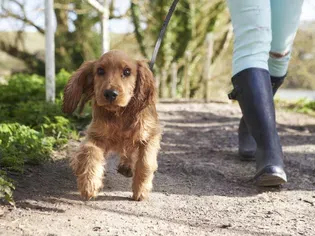How to Housetrain Your Puppy
Updated on 05/27/24

Master the Art of Housetraining: A Comprehensive Guide for Puppy Parents
Introduction
Welcoming a furry bundle of joy into your home is an exciting adventure, but housetraining can be a perplexing challenge. Fear not, fellow puppy parents! This comprehensive guide will equip you with the knowledge and techniques to transform your little mischief into a well-behaved housemate.
Understanding Your Puppy's Needs
Before diving into specific training methods, it's crucial to grasp the underlying reasons for puppy accidents. Understanding their natural instincts and biological cues will help you create a training plan tailored to their individual needs.
Potty Training Basics
This is the core of housetraining and involves teaching your puppy the designated areas to relieve themselves. Here are some foundational principles:
* Establish a Regular Schedule: Puppies have small bladders and will need to go frequently. Determine a regular potty break schedule based on their age and activity level.
* Choose a Potty Spot: Designate specific spots both indoors and outdoors where you want your puppy to do their business. Use a consistent command like "go potty" or "outside."
* Reward Success: Catch your puppy in the act of using the designated potty spot and reward them immediately with praise, treats, or a game. This positive reinforcement will encourage them to associate the correct behavior with rewards.
* Avoid Punishment: Never punish your puppy for accidents. This will only damage your bond and make them afraid to go to the bathroom in front of you.
Crate Training
Crate training can be a valuable tool in housetraining, providing a safe and cozy den for your puppy. Here's how to incorporate it:
* Introduce the Crate Gradually: Initially, let your puppy explore and become comfortable in the crate with the door open. Gradually increase the time spent inside with the door closed.
* Establish a Den-Like Environment: Make the crate a relaxing space with a comfy bed, familiar toys, and a blanket that smells like you.
* Limit Crate Time: Puppies should not spend excessive time in the crate, as this can hinder their development and socialization. Use it mainly for naps, bedtime, and when you cannot supervise them.
Housebreaking Problems and Solutions
Even with the best training, accidents can happen. Here are common challenges and their solutions:
* Regression: If your puppy has been housetrained but suddenly starts having accidents, investigate any potential underlying medical issues or changes in their routine.
* Submissive Urination: Some puppies urinate when they feel overwhelmed or submissive. Identify situations that trigger this behavior and provide reassurance and support.
* Marking Territory: Intact puppies may mark their territory by urinating or defecating indoors. Consider spaying or neutering your puppy if this becomes a problem.
Professional Help
If you encounter persistent housetraining issues, do not hesitate to consult a certified veterinary behaviorist or dog trainer. They can provide personalized guidance and help address any underlying behavioral or medical problems.
Conclusion
Housetraining your puppy requires patience, consistency, and a deep understanding of their natural instincts. By implementing the techniques outlined in this guide, you can establish a harmonious relationship with your furry companion and enjoy a clean and well-behaved home. Remember, every puppy is different, so adjust the training plan to their individual needs and temperament. With love, dedication, and a dash of humor, you will transform your rambunctious pup into a housetrained, well-behaved member of your family.
Explore More Pets

Basic Training
Puppy and Baby Introductions

Working Dog Breeds
All About Search and Rescue Dogs

Dog Treatments
Puppy Vaginitis: Signs, Causes and Treatment

Dog Adoption
After More Than 1,200 Days in the Shelter, Coco Goes Home

Basic Training
How to Train Your Puppy to Go on Potty Pads

Hybrid Dog Breeds
The Difference Between a Mutt, Mixed Breed, or Designer Dog?

Dog Treatments
Nail Problems in Dogs

Puppies
7 Reasons Why Two Dogs Are Better Than One
